Review: The Speakeasy Society Brilliantly Draws Audience Members into THE JOHNNY CYCLE at Mountain View Mausoleum
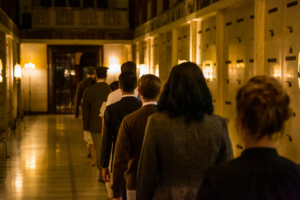
"To fight that war, they would need men and if men saw the future, they wouldn't fight it." So is a thought shared by Dalton Trumbo's central character in his 1938 novel "Johnny Got His Gun" in which Joe Bonham, a young man who enlisted in WWI, winds up hit by a German shell which exploded on him, leaving him with no legs, feet, ears, eyes, or even a face. And yet poor "Johnny" as he is now known due to the loss of his identity, survived and was taken from the battlefield to a rudimentary hospital, where he has been kept alive by modern technology as he lies unable to communicate with anyone, other than turning his head from side to side as a way of letting his caregivers know he understands what is being said or done for him.
With his mind fully intact 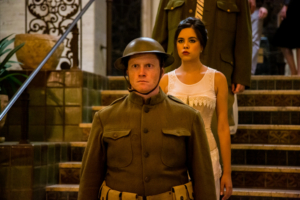 in a body that has been destroyed, Johnny thinks about his life, choices he made, his Mother left behind who devoted her life to him, his less-than-perfect father and his teenage girlfriend, all of whom will never know what happened him since his identity has been lost. So now his only communicate is with the kind Nurse who attends to his most intimate needs as he lays there examining his past present and future life, knowing he will never be able to return to the outside world or let those he left behind know what happened to him. The imagination of readers is taken along on his journey as a prisoner of his own doing, thanks to a rash decision made which changed his life forever - to serve his country on the battlefield to save democracy. But at what cost?
in a body that has been destroyed, Johnny thinks about his life, choices he made, his Mother left behind who devoted her life to him, his less-than-perfect father and his teenage girlfriend, all of whom will never know what happened him since his identity has been lost. So now his only communicate is with the kind Nurse who attends to his most intimate needs as he lays there examining his past present and future life, knowing he will never be able to return to the outside world or let those he left behind know what happened to him. The imagination of readers is taken along on his journey as a prisoner of his own doing, thanks to a rash decision made which changed his life forever - to serve his country on the battlefield to save democracy. But at what cost?
Trumbo's ode 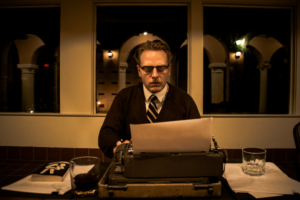 to reminding the world's people that if war is to end, we must be the ones to just say "No, I won't go," no matter what rhetoric is thrown at us by those in charge. I remember well how the 1971 movie, based on his anti-war novel written in an attempt to prevent men from enlisting for WWII by reminding them that "if the goal is to make democracy safe then nothing else matters - not the millions of dead bodies or the thousands of ruined lives," inspired so many of us to protest against the Vietnam War draft which was taking young men away to die in a war many did not believe we should be fighting.
to reminding the world's people that if war is to end, we must be the ones to just say "No, I won't go," no matter what rhetoric is thrown at us by those in charge. I remember well how the 1971 movie, based on his anti-war novel written in an attempt to prevent men from enlisting for WWII by reminding them that "if the goal is to make democracy safe then nothing else matters - not the millions of dead bodies or the thousands of ruined lives," inspired so many of us to protest against the Vietnam War draft which was taking young men away to die in a war many did not believe we should be fighting.
"At the core of the novel is the struggle to be understood, 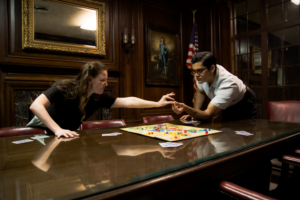 not just to be heard, but to believe your thoughts, feelings, experiences, and sacrifices can create actual change, can move mankind forward," Julianne Just, co-director said of the larger themes in THE JOHNNY CYCLE. "We allow the audience, as Johnny, to grapple with questions of choice, nationalism and the larger impact that war has on both those who are asked to fight, and those who are left behind to pick up the pieces. Through the show, we give a voice to the deceased, and highlight the willful choice not to listen, both as a society and as individuals - particularly about the human cost of war."
not just to be heard, but to believe your thoughts, feelings, experiences, and sacrifices can create actual change, can move mankind forward," Julianne Just, co-director said of the larger themes in THE JOHNNY CYCLE. "We allow the audience, as Johnny, to grapple with questions of choice, nationalism and the larger impact that war has on both those who are asked to fight, and those who are left behind to pick up the pieces. Through the show, we give a voice to the deceased, and highlight the willful choice not to listen, both as a society and as individuals - particularly about the human cost of war."
And recently, thanks to 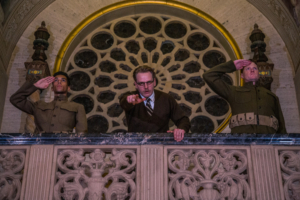 What No Proscenium calls "a master class in audience immersion," I was given the chance to actually participate as Johnny in a stunning re-imagining of Trumbo's novel during THE JOHNNY CYCLE set amongst the marble hallways of the Mountain View Mausoleum in Altadena. Before entering to performance space, audience members are divided into small groups of no more than six people, with actors portraying the characters in Trumbo's own life as well as Johnny's, as we are escorted through the walls of tombs and intimate spaces within the mausoleum, with your experience of the evening guaranteed to be different depending upon which character pulls you along as they share their part in the novel and/or Trumbo's life.
What No Proscenium calls "a master class in audience immersion," I was given the chance to actually participate as Johnny in a stunning re-imagining of Trumbo's novel during THE JOHNNY CYCLE set amongst the marble hallways of the Mountain View Mausoleum in Altadena. Before entering to performance space, audience members are divided into small groups of no more than six people, with actors portraying the characters in Trumbo's own life as well as Johnny's, as we are escorted through the walls of tombs and intimate spaces within the mausoleum, with your experience of the evening guaranteed to be different depending upon which character pulls you along as they share their part in the novel and/or Trumbo's life.
With so many scenes going on at the same time, 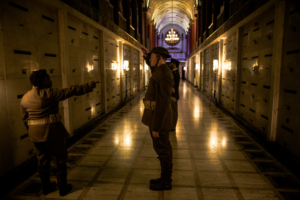 you will not see them all except a few times when the entire audience is brought into the same space at the same time. As the audience traverses memories, dreams, emotional and real battlefields, coming in contact with a multitude of characters, we re-visit Johnny's childhood loves, family members, war room generals, soldiers, nurses, and even major religious figures, each performed to perfection while maintaining the ability to guide and interact with audience members who are often asked to participate and/or share comments during each scene. Soon it becomes apparent that each character, whether intentional or not, has sent Johnny to his destiny as he desperately struggles to be heard, trapped between the living and the dead without a voice.
you will not see them all except a few times when the entire audience is brought into the same space at the same time. As the audience traverses memories, dreams, emotional and real battlefields, coming in contact with a multitude of characters, we re-visit Johnny's childhood loves, family members, war room generals, soldiers, nurses, and even major religious figures, each performed to perfection while maintaining the ability to guide and interact with audience members who are often asked to participate and/or share comments during each scene. Soon it becomes apparent that each character, whether intentional or not, has sent Johnny to his destiny as he desperately struggles to be heard, trapped between the living and the dead without a voice.
The Speakeasy Society's THE JOHNNY CYCLE is brilliantly presented 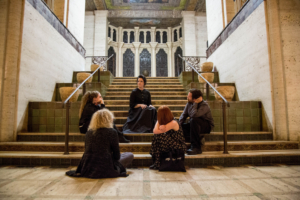 as true interactive theater with audience members participating in each and every scene they witness, playing various supporting or ensemble roles, interacting with Trumbo as he bangs away at his typewriter to come up with new script pages, to those from the House Un-American Activities Committee for whom he refused to testify during their 1947 investigation of Communist influences in the motion picture industry which led to his blacklisting. And yet his novels and screenplays went on to win awards and will carry his memory and call to action with us for all time.
as true interactive theater with audience members participating in each and every scene they witness, playing various supporting or ensemble roles, interacting with Trumbo as he bangs away at his typewriter to come up with new script pages, to those from the House Un-American Activities Committee for whom he refused to testify during their 1947 investigation of Communist influences in the motion picture industry which led to his blacklisting. And yet his novels and screenplays went on to win awards and will carry his memory and call to action with us for all time.
While your experience will be different than mine was, 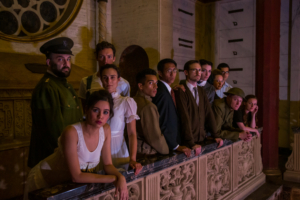 several scenes I participating in certainly stick in my mind both emotionally as well as life-affirming in content. A few instances took place during the courtroom trial when an audience member was asked to identify anyone in the room they knew to be a Communist, and she pointed to the man accusing Trumbo of just that, leading to spontaneous laughter and applause. Kudos to all the players in the courtroom scene for bringing the absurdity of the dangerous situation to life.
several scenes I participating in certainly stick in my mind both emotionally as well as life-affirming in content. A few instances took place during the courtroom trial when an audience member was asked to identify anyone in the room they knew to be a Communist, and she pointed to the man accusing Trumbo of just that, leading to spontaneous laughter and applause. Kudos to all the players in the courtroom scene for bringing the absurdity of the dangerous situation to life.
At one point, I was led into a narrow hallway with army cots 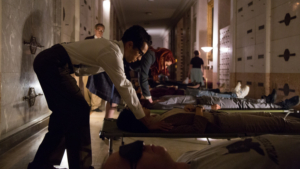 lined up in the center and was asked to carefully lay down on one of them, being addressed as "Johnny" and told I was going to be well taken care of while there. Soon a blindfold was placed over my eyes, taking me inside how Johnny must have felt being there and cared for while being unable to see or communicate back. I thank the actor, Robert Paterno, for the wonderful shoulder rub I received and his tender care of me during this scene, even spelling out "Merry Christmas" in my palm as the staff conversed about their own holiday plans while caring for us.
lined up in the center and was asked to carefully lay down on one of them, being addressed as "Johnny" and told I was going to be well taken care of while there. Soon a blindfold was placed over my eyes, taking me inside how Johnny must have felt being there and cared for while being unable to see or communicate back. I thank the actor, Robert Paterno, for the wonderful shoulder rub I received and his tender care of me during this scene, even spelling out "Merry Christmas" in my palm as the staff conversed about their own holiday plans while caring for us.
But it was my final one-on-one character encounter with Chynna Skye as Dalton Trumbo's sophisticated wife 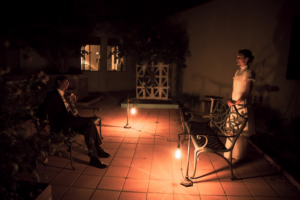 which affected me the most personally as her ability to meet my stare seemed to create a soul-to-soul communication between the two of us. Seated with her in a small two-person gated tomb as she shared her memories of her husband with me, my own memories were brought into my mind, taking me back to a wonderful time at a childhood birthday with my best friend, truly one of the earliest happy memories I can recall when asked to do so. And the shock of her comment, "Memories may not be real but just imagined" did nothing to dull the peace I felt as I walked out of the Mausoleum and back into real life, knowing that even that experience could just be in my imagination.
which affected me the most personally as her ability to meet my stare seemed to create a soul-to-soul communication between the two of us. Seated with her in a small two-person gated tomb as she shared her memories of her husband with me, my own memories were brought into my mind, taking me back to a wonderful time at a childhood birthday with my best friend, truly one of the earliest happy memories I can recall when asked to do so. And the shock of her comment, "Memories may not be real but just imagined" did nothing to dull the peace I felt as I walked out of the Mausoleum and back into real life, knowing that even that experience could just be in my imagination. 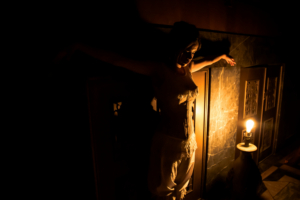 It certainly was a pleasure to meet the actress after the performance and thank her personally for the special, happy memory moment she brought to my life. May you experience the same thing in your own way during THE JOHNNY CYCLE.
It certainly was a pleasure to meet the actress after the performance and thank her personally for the special, happy memory moment she brought to my life. May you experience the same thing in your own way during THE JOHNNY CYCLE.
With an original script created and produced by The Speakeasy Society by Co-Artistic Directors Matthew Bamberg-Johnson, Genevieve Gearhart, and Julianne Just, with Associate Artistic Directors Michael Bates and Chris Porter, Producing Director John Henningsen, and Production Manager Andrew Lia, THE JOHNNY CYCLE cast features the amazing talents of Brandon Bales, Matthew Bamberg-Johnson, Michael Bates, James Cowan, Jenny Curtis, A'raelle Flynn-Bolden, Emilio Garcia-Sanchez, 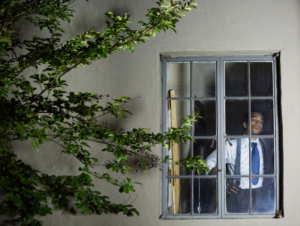 Christie Harms, Zan Headley, John McCormick, Haylee Nichele, Robert Paterno, Bianca Ruiz-Brokcl, and Chynna Skye, all dressed to period perfection by Felicia Rose, and sound design by Martin Gimenez which adds not only ringing telephones but marvelous music piped in enhance the mood of many scenes. Many actors portray more than once character, so I apologize for not being able to identify which played the extraordinary roles of Dalton Trumbo and Johnny's mother.
Christie Harms, Zan Headley, John McCormick, Haylee Nichele, Robert Paterno, Bianca Ruiz-Brokcl, and Chynna Skye, all dressed to period perfection by Felicia Rose, and sound design by Martin Gimenez which adds not only ringing telephones but marvelous music piped in enhance the mood of many scenes. Many actors portray more than once character, so I apologize for not being able to identify which played the extraordinary roles of Dalton Trumbo and Johnny's mother.
THE JOHNNY CYCLE runs Thursdays through Saturdays at 8pm (dark Labor Day weekend), at Mountain View Mausoleum, located at 2300 Marengo Avenue Altadena, California 91001. Admission is limited to a small number of audience members for each performance, lasting two hours without an intermission. Plan ahead as Restrooms will only be available before and after the performance and there will be no late admittance. General admission is $125 per person, and must be purchased in advance at speakeasysociety.com/the-johnny-cycle
Please note this interactive production features light-to-familiar physical contact from performers and discussion of adult themes. While there is a wheelchair accessible track, the audience will be asked to walk, kneel, run and/or stand throughout. It is intended for audiences of 14 years of age and older.
The Speakeasy Society is an LA based immersive entertainment company creating intimate and epic experiences in unexpected places. We craft shared experiences where audience interaction plays a vital role in the performance. speakeasysociety.com
Mountain View Mausoleum was founded in the nineteenth century, located at 2300 Marengo Ave in Altadena, California 91001, and is one of the few remaining family-operated cemetery/mortuary properties in Southern California. The Mausoleum was considered the crown jewel of the more than 80 mausoleums constructed by Cecil E. Bryan and features extensive stained glass installations created by the Judson Studios of Los Angeles, CA. http://www.mtn-view.com
All photos by Model05 Productions
Reader Reviews

Videos
